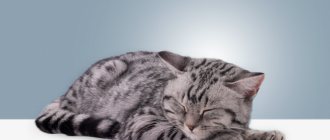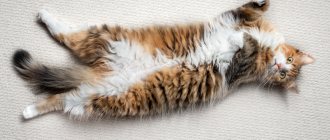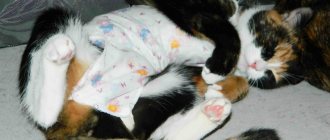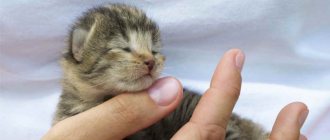( 2 votes, rating: 3.00 out of 5)
5589564
05/13/2021 owner reviews 2,
Cats are fascinating animals, at least to me. My cats do things all the time that I don't fully understand, and that's okay.
Some of the places where my cats sleep always baffle me. Like when I find a cat in the laundry basket. Just recently one of my cats has started laying on my legs whenever possible. Not at my feet, but literally on my feet.
This always makes me not move my legs so as not to disturb her. But I always have to do it. So the question is, why does my cat lie down?
After doing some research on this topic, we discovered some interesting facts related to cats. I also discovered that cats, or pets in general, sleeping on their owner's legs is actually more common than I thought!
- Cats love feet - but why do they love feet?
- They want to sleep next to you
- Remember it's a compliment
- In short, why does a cat lie down on its feet?
Vampirism
There is an opinion, which has not yet been scientifically confirmed, that cats are energy vampires and people very quickly become dependent on them. Some people really call it love.
Avid cat lovers also claim that cats only take away negative energy and they do this when they press their warm tummy to you. That is why they love to lie exactly where the owner or mistress is experiencing pain, relieving unpleasant symptoms; older people especially like to be treated in this way when a large bouquet of sores is collected, the heart is playing naughty and the pressure is jumping. Well, all that remains for now is to take this hypothesis on faith.
Biological
Everyone knows that cats love to bask near radiators, on stoves, beds and other warm objects. The instinct of self-preservation forces the animal to look for a safe place to sleep in order to prevent hypothermia. The human body temperature is much warmer than room temperature. As they say, dry, cozy, soft and comfortable. The choice of location is also determined by the fact that getting kicked at night is not as scary and dangerous as being accidentally crushed under the torso. Especially if the owner’s build is far from ideal proportions.
Why do cats like to sleep on humans?
For all the millennia that cats have lived next to people, the human race has never learned to understand these mysterious creatures. Therefore, it is impossible to say exactly why they prefer to sleep on their owners, choosing different parts of their bodies (head, legs, stomach, chest, etc.). Only the cats themselves know this, but, alas, they cannot tell about it and we can only speculate.
Cats love to sleep on their owners.
Mystical explanation
Since ancient times, cats have been credited with psychic qualities and the ability to heal people. It is believed that the cat lies down exactly where it hurts (or doesn’t hurt yet, but will get sick in the near future). Allegedly, having its own powerful energy, the pet senses an area with a changed energy field and, by moving there, neutralizes its negative impact, and also relieves pain.
When an animal stubbornly tries to lie down on its legs, this may indicate some problems in the limbs with joints (arthritis, arthrosis) or veins (varicose veins). If nothing bothers the owner in this area for now, then the little healer will work for the future and relieve joint tension, as well as fatigue accumulated over a long day of work.
Many cats like to sleep on their feet
However, most often, furry healers sit comfortably on a person’s stomach, which is easily explained by the presence of a large number of internal organs in this part of the human body. Felines are distinguished by their ability to sensitively respond to the psychological state of household members. Having settled down in the solar plexus area, the cat will help improve your mood, relieve tension and stress, and also relieve the blues and depression.
A good friend of mine who suffers from heart failure always places his cat on the left side of his chest. At first he stomps around a little, then he carefully lies down, curled up into a ball. The man claims that this brings noticeable relief.
A cat systematically trying to lie on its owner's head thus relieves his mental stress. Experienced cat owners say that these animals are extremely sensitive to changes in atmospheric pressure. They are trying to help weather-dependent people, alleviate their condition caused by cerebral vasospasm, and relieve migraines. At the same time, they can hug the host’s skull with their entire body.
Some cats prefer to lie next to a person’s face and even on top of a person’s head.
Features of cat sleep
Watching how your furry pet sleeps serenely, you can notice interesting features of its behavior:
- Even a cat that seems to be deeply asleep at first glance does not stop reacting to environmental stimuli. Watching carefully, you can see how the whiskers, tips of the ears, eyelids and paws of the animal twitch.
- Foreign neurophysiologists claim that cats dream. Scientists believe that most often they dream of hunting or skirmishes with enemies.
- Furry pets have two stages of sleep: napping and deep sleep. During the first, the animal's muscles remain tense and the metabolism slows down. During this phase, the animal wakes up very quickly at the slightest external stimulus.
Deep sleep is characterized by complete relaxation of the animal's muscles (cats often fall during this process if they fall asleep on a hill). A cat emerges from such sleep much more slowly than from a nap.
- Cats have approximately three times more REM sleep than humans.
- Newborn babies sleep only in deep sleep; their drowsiness phase is not developed.
Spending most of their lives sleeping, pets sometimes choose the most unexpected places to rest: washing machines, closet shelves, carelessly left bags or baskets, etc.
We recommend reading about how to stop a cat from scratching wallpaper and furniture. You will learn about the causes of property damage, methods aimed at eliminating this problem, cutting nails, and eliminating stress factors.
Here's more information on how to trim a cat's claws.
What to remember when falling asleep next to a cat
Owners of furry purrs are unlikely to refuse to fall asleep at least once while stroking their beloved pet. But frequent nighttime spending with a cat in the same bed can result in a number of troubles. Thus, somnologists cite a theory according to which the quality of sleep noticeably deteriorates in those who like to sleep with pets. Because of this, the effectiveness of rest time also decreases. And all because cats by nature are nocturnal animals and can rarely sleep next to their owner until the morning.
Cats may find it difficult to sleep through the night.
Other negative consequences of sleeping together between humans and cats include:
- feeling of discomfort. Since in the middle of the night a cat can begin to purr and trample the owner with its paws, and sometimes bite if the animal does not like the behavior of the breadwinner in a dream;
- violation of hygiene. An animal living in the same house as a person must be free of parasites - helminths and fleas. In addition, the cat must be washed regularly to avoid the risk of Toxoplasma infection. And yet, despite observing all the “rules of cleanliness,” under no circumstances should a pet be allowed to enter a child’s crib;
- the appearance of an allergy to skin particles or animal saliva. Research has shown that the widespread belief that the body has a negative reaction to cat fur has no basis. However, allergies are caused by substances secreted by the endocrine glands of furry animals.
Taking precautions into account, you should take care of creating a warm and soft sleeping place intended for your beloved cat. Perhaps the cozy corner will appeal to the tailed friend and the animal will have fewer reasons to crawl under the blanket with its owner
Cats are often associated with laziness and the desire to sleep. Which is not surprising, since these pets are in the arms of Morpheus up to 70% of the time. The ancients believed that a place chosen by a cat for sleeping was better to choose for the owners of the house for a night's rest. But sometimes it happens that a furry pet sleeps right on a person, climbing onto his chest, stomach or even head. This behavior is explained by a number of reasons - from the animal’s desire to warm up and bask next to the breadwinner to the demonstration of the cat’s leadership qualities and healing abilities
In any case, it is important to remember precautions and take care of the cleanliness and health of your affectionate purr in advance.
Is it possible to sleep together?
A cat poses no danger to humans.
Therefore, you don’t have to worry about your pet constantly sleeping next to you. These pets choose one person as their favorite and always lie down next to him. Such love can be easily explained. The fact is that cats like the smell of a certain person. He gets so used to him that he tries to constantly be near him at any time of the day or night. You can sleep in the same bed with a pet if it does not cause you discomfort. But still, sometimes it is better to avoid it. For example, if you sleep very restlessly, you often toss and turn in your sleep. In a dream, a person cannot control himself and can harm his pet. Many animals also sleep deeply, and in order not to injure the cat, it is better to provide him with a separate sleeping place.
Such a neighborhood is undesirable for a pregnant woman. In order to protect yourself and the health of your unborn baby, you should sleep in your bed without a cat. If the cat is already accustomed to sleeping with the owner all the time, then you need to wean him from this habit. Moreover, soon, when the baby is born, there will be an infant next to the woman, so it is undesirable for there to be a pet in the same bed.
Many pets have a very positive attitude towards the youngest members of the family and love to spend the night in their bed.
You should not allow a cat to sleep in a small child's bed. The baby may choke or choke on the fur of a furry animal. In addition, most children sleep very restlessly, shudder in their sleep, and toss and turn a lot. Thus, a child can harm a cat or a pet can harm him. Many cats are frightened by sharp sounds and movements and may accidentally scratch a child out of fear.
Since by nature all cats are awake at night, when your pet wakes up, it may begin to play with its toes, which will disturb your sleep. And if your pet gets carried away, it may scratch you.
If your pet regularly goes outside, then you should not let him sleep in the same bed with you. He can bring any infection from the street, which will negatively affect the health of all family members.
Where cats sleep: energy
- The cat's biofield has a beneficial effect on humans. These animals remove negative waves, impulses, sensations. Therefore, in the place where the cat sleeps, negative energy prevails.
- The cat tries to neutralize it and lies down in exactly the right place.
- Cats sense the intersection points of magnetic fields, which can negatively affect human health.
- The animal lies down in this place and stabilizes the energy flows, transforming them into calm and peaceful waves.
Cats are a source of bioenergy. The intersection of different energies in one house can be a positive and negative factor.
- Cats are sensitive to places where biofields intersect. Such points can negatively affect human health.
- The animal chooses a similar point for sleep and normalizes the energy, transforming it into a favorable one.
- The cat's biofield has a positive effect on humans. Pets neutralize negative waves.
- The cat tries to stabilize places with negative energy and locates itself in them.
Do not try to force your cat to sleep in a specific place in the apartment. He knows where to go to bed. Since sources of negative energy tend to change location, sensitive cats follow these movements.
Useful video
Watch this video about what diseases cats can treat:
Similar articles
- Why does a cat rub against the legs of people, the owner, what does it mean...
You will learn about the reasons for this behavior of a pet, the characteristics of a cat's sleep, the favorite places to sleep in... Experts in the field of animal psychology consider the behavioral line to be the reason why a cat rubs against its legs. Read more - Why do cats crush people with their paws, why do cats...
We recommend reading about why cats sleep at their owner's feet. You will learn about the reasons for this behavior, the characteristics of cat sleep, and favorite places to sleep. And here is more information about how to remove a cat from a tree yourself and with... Read more
- How to stop a cat from biting, scratching, what to do if...
If there is a bully in the house, you have to decide how to stop the cat from biting or scratching. What should owners do if the cat is angry and bites when you pet it? How to stop a cat from scratching its legs? Read more
- Why cats love valerian: how it works...
Many animals, after overstimulation of the nervous system, fall into a long, uninterrupted sleep. ... Why do cats crush people with their paws, why do cats... Why do cats sleep in their feet: what does this mean, why do cats... Read more
- Why does a cat drool from its mouth: causes and treatment
Should I be concerned if my cat is drooling? Any owner should understand that if a cat is drooling from its mouth, this is a physiologically abnormal phenomenon; there is always a reason, which is extremely important to determine. Read more
Why does a cat sleep near its head?
The most obvious answer is, of course, the animal's proximity to a heat source. Smart cats know that the human head has the greatest heat transfer in the entire body.
For reference: sometimes cats choose a place near their head, due to the fact that the aroma of their beloved owner is best felt in this area.
Cats may like the smells contained in shampoos or perfumes, which remain after several sleeping sessions, including on the pillow.
And, of course, by laying down near the head, the cat shows its friendly and trusting attitude towards its owner. Neither people nor animals will want to sleep next to those they don’t love. And the nose-to-nose position cannot but speak of a special reverent attitude. Therefore, if a pet strives to sleep near its owner’s head, this means that he loves him.
A careless cat during general sleep can stretch out its tail and end up in a person’s open mouth - he, in turn, will not be able to breathe. In this case, panic often occurs, followed by a ban on the animal being placed near its head.
The cat is licking or scratching
The habit of cats to lick and comb themselves from morning to evening is reflected in folk signs and, as a rule, promises the arrival of guests or a change in the weather. In fact, the reason for this behavior is not climatic conditions, but a natural desire for cleanliness. A cat will lick anything that seems dirty to it, including its own owner.
Moreover, her concepts of cleanliness do not coincide at all with human ones: hands washed with soap will be licked just as mercilessly as dirty ones. This habit also extends to open wounds, surgical sutures, and bedsores, so veterinarians hinder the process by putting a special collar on the animal.
The second reason for this behavior is the maternal instinct, the pet shows love and care, and the person acts as a child.
The main reasons why a cat lies on its back
The origins of habits must be sought in childhood
From birth, kittens get used to the fact that their mother carries out hygiene procedures, paying special attention to the surface of the child’s belly. The cat licks the babies not only to keep the fur clean, but also to prevent digestive problems, since newborns have a poorly developed gastrointestinal tract
An obese cat is no joke
A grown adult retains memories of favorite childhood moments, and sleeping in a relaxed position helps calm the nervous system. And if an older cat sleeps with its owner on its back, with its paws outstretched, then in this way it subconsciously seeks a replacement for its mother cat and protection from external irritants in its face.
Best articles: What types of natural resources is the European North rich in?
For your information! Chinese wisdom says that only the righteous and kings can sleep on their backs. This statement can be transferred to furry pets - a royal person should not experience discomfort while resting.
Convenience and comfort
Trying to sleep with your belly up indicates bliss and complete satisfaction with life. Bizarre curves and sound sleep are not a reason to look for hidden meaning or call a veterinary ambulance. This position is simply convenient, and you should not change it by forcibly turning your pet into the correct position.
Important! It has been observed that the cat lies on its back in its house or box to achieve the most comfortable conditions. A couch potato can stretch, wriggle and return to a comfortable body position.
Trust in the owner
Why does a domestic cat lie on its back in front of its owner under normal conditions:
- feels well, is not bothered by illnesses;
- completely trusts its owner;
- He doesn’t think there could be any danger in his apartment.
Experienced breeders are confident that this position communicates the warmest possible relationship between the cat and the owner, and the pet’s love for its owner. If a cat lies on its back, raises its paws up and stretches sweetly, then with these movements it shows the highest degree of trust. It is very difficult to earn such an attitude from an animal.
Important! You should not assume that this cat behavior is an invitation to affection. When trying to stroke the belly during sleep or shake a limp animal, you can get hit with a paw with extended claws
A sleepy pet acts instinctively, and the only culprit in an urgent problem is the owner.
Binge eating
Animals that rarely leave the apartment or have been sterilized suffer from uncontrolled gluttony. The problem is the lack of necessary physical activity and the constant desire to beg, steal or demand an additional bowl of food. The pity of the owners leads to systematic overeating and digestive problems.
Habits do not depend on breed
After the next portion of food, the pet feels the need to rest. He cannot lie on his stomach, as unpleasant sensations arise. As a result of an overfilled stomach, he will have to take a forced position, tuck his limbs, as long as nothing puts pressure on the stomach and intestines.
From a distance, it seems that the cat is simply lying on its back, although at this moment the furry pet is having difficulty digesting the excess food. The problem of gluttony is acute and requires the owner to correctly calculate portions, use balanced feed, and feed no more than 2-3 times a day.
Cats prefer unusual body positions for many different reasons. Common ones include:
- puberty or mating season. A healthy pet that has not been spayed or neutered periodically feels discomfort in the groin area. The cat is forced to lie on its back to reduce discomfort;
- hot weather. An open belly and a gentle breeze help you cool down faster. That is why animals prefer to move from a comfortable sofa to an uncarpeted floor or tile in the heat;
- weather changes. Not only the adult, but also the young animals feel the imminent change in temperature. Increased sensitivity helps felines survive in the wild. The pet also reacts to changes: when it is hot, it lays down with its belly up; when it gets cold, it prefers to curl up in a ball, tucking its paws under itself;
- pregnancy. Bearing offspring is a complex process. Multiple pregnancies and large kittens actively put pressure on internal organs and interfere with the functioning of the respiratory system.
When you place your palm on the abdominal wall of the expectant mother in the last stages, you can feel the babies moving. Folk omens say that sleeping on the cat's back foretells large cubs or an unprecedented number of offspring.
Is it possible for a cat and a person to sleep in the same bed?
It is assumed that if a cat lays on a person, then it is its person. Many people completely agree with this statement. The owner must provide the fluffy with a balanced diet and comfortable living conditions. For this purpose, houses, baskets with soft mattresses, and beds are purchased. There are even special heated mats that caring family members buy. However, for a furry couch potato, there is nothing better than the bed of a loved one.
Arguments for
There is an opinion that the mustachioed pet and its owner are very similar. Moreover, we are talking not so much about external similarity as about the inner world. Therefore, two close beings strive to spend more time together, including in sleep.
When a cat is placed on a beloved family member, it takes on some of the stress. Problems and anxieties fade into the background when a person strokes a pet and hears its rumbling. And the most important argument is that sleeping together gives a feeling of comfort and pleasant emotions.
An invisible connection arises between a person and a furry homebody, which allows you to enjoy communication not only during the day, but also at night. Close beings usually have difficulty withstanding separation from each other, so sleeping alone is not acceptable to them.
Arguments against
Experienced breeders, zoologists and veterinarians are not supporters of keeping a mustachioed friend on a bed or on a person. Many felinologists declare the inadmissibility of joint recreation. The following reasons are put forward as arguments:
- Animals are carriers of infectious diseases.
- Dirt from paws leads to rapid soiling of bed linen.
- If a cat suddenly gets sick, then he needs a bed isolated from humans and other inhabitants of the house.
- A kitten that climbs onto the bed in search of warmth may be injured. There is a high risk of crushing the baby.
- Even the friendliest mustache sleeping next to a child can accidentally scratch him.
- During periods of heavy shedding, an animal's fur can cause allergies or simply discomfort in the person sleeping next to it.
In order to get a good night's sleep, a person needs to create comfortable conditions around him. A pet that tries to settle comfortably on the owner’s body is unlikely to contribute to this. To ensure that both family members get a good night's sleep, you should think about purchasing a separate, comfortable bed for your wayward mustache.
The best option that will suit both the owner and the animal is to arrange a separate corner on the bed for the pet. You can arrange a bed for him on the side - or place a covered chair or armchair next to the bed, on which the cat will happily rest.
Precautions
To ensure that sleeping on the same bed brings only pleasure and is safe, you must comply with the requirements for keeping furry friends. This will ensure comfortable sleep for the owner and a high standard of living for the pet itself.
It is important to regularly visit a veterinary clinic for examinations and preventive and routine vaccinations. It is necessary to give medications against parasites in a timely manner. Animals walking on the street are given them once every 3 months, and homebodies - 2 times a year. . After visiting the street or litter box, you need to wash your paws, and once every six months, give them a full bath.
Don't forget to use a nail clipper and furminator during shedding.
After visiting the street or litter box, you need to wash your paws and give them a full bath once every six months. Don't forget to use a nail clipper and furminator during shedding.
There are many versions about why a cat falls on a person. Zoologists, owners and breeders have their own assumptions and hypotheses. Most often, we are talking about a simple desire to bask on a soft bed or mention of the healing abilities of a fluffy. In any case, before allowing your cat to lie down next to you, you need to think about the cleanliness and health of your pet. Then sleeping together will bring only positive emotions.
What is a cat's sleep phase?
As mentioned, a cat's sleep phase is divided into a series of naps and deep sleep stages. Napping is usually a quick nap where the cat remains relaxed but at the same time alert to what is happening outside.
If a cat stays in this stage of sleep long enough to feel safe, it will eventually enter REM or deep sleep. When your cat is in deep sleep, you may notice that she shakes or moves while she sleeps.
This movement also tells us what cats dream about and what they can essentially dream about. When cats are daydreaming and in REM sleep, they may also perceive external stimuli (such as the smell of their food) and respond as if they were awake (moving their nose to pick up a scent).
In conclusion, it can be said that if a cat spends a long time sleeping, this is completely normal and necessary. The only time we would suggest that you would be a little concerned is if your cat sleeps more than these average hours.
Additionally, if your cat does not get up to eat, drink, play, or urinate during the sleep phase, caution should be exercised and a veterinarian should be consulted.
How to stop a cat from sleeping on your feet?
If for some reason you are against co-sleeping, you will have to work on your pet’s habits. Let’s make a reservation right away: the process is not fast and it is absolutely impossible to speed it up. If your cat has always slept with you, but there are compelling reasons to change this algorithm, you need to proceed as follows:
- Provide a comfortable cat bed in your bedroom.
- At every opportunity, take the cat to a bed (after eating, when guests arrive, when you go to the bath, etc.).
- Place a box of cat toys next to the bed.
- Populate the lounger with your old sweater or piece of blanket.
- Place the cat on a bed, pet it and calm it down every evening before bed.
- Do not chase the cat out of the bed, even if it has left the bed, at least at first.
- If the cat comes to the bed, and you do not intend to put up with it, carefully transfer it to the lounger and stroke it until it purrs or settles down.
- If your pet responds adequately to treats, be sure to reinforce them with praise.
Best articles: Object of study of the science of embryology
Act gradually, cats are not stupid and understand perfectly well what is wanted from them. However, changing habits takes time, at least 15–20 days. When weaning a cat from sleeping together, you need to increase the time of games and communication outside the bedroom. The tailed animal must understand that you are not fenced off from it, but simply “change the situation.”
How many hours a day do kittens sleep?
If you have a litter of newborn kittens at home, you may notice that they spend most of their time sleeping. It's also normal that this can cause anxiety for any new kitten owner. However, as long as these kittens wake up to eat and be collected by their mother, there is no need to worry.
During the first days of a kitten's life until 4 or 5 weeks of age, kittens sleep about 90% of the day. This is approximately up to 20 hours of sleep per day. But is all this sleep time necessary for kittens? Yes! Because while kittens sleep, hormones are produced that stimulate their growth. This amount of sleep ensures that the kitten is fully developed within the agreed period of time.
Although kittens sleep a lot, they do not remain completely inactive. It is not uncommon to notice that when your kitten is in deep sleep, he will move his paws or that his body will tremble. These movements correspond to the exercise necessary for the proper development of the kitten.
By the fifth week, kittens dramatically reduce their sleep time to about 65% of their time. You will notice that the remaining 45% of this time will be spent playing and feeding.
Purr
There is a belief that a cat predicts the outcome of a situation with its purring:
At the patient's bedside - a speedy recovery.
Sitting on a suitcase - an easy road.
In preparation for the wedding - a happy family life.
Fishermen have a rich catch.
On the guest's lap - a good relationship.
Purring, or rumbling, in cats usually accompanies a state of pleasure, hence the sign - if the cat is happy, then everything will be fine.
Sound originates in the muscles located around the vocal cords, which begin to vibrate under the influence of electrical impulses from the cerebral cortex. It is worth noting that not only cats can purr, but also many other animals: hares, foxes, badgers, bears and even elephants.
Why do cats sleep on humans?
There are several reasons why a cat prefers to sleep next to a person and purr near him.
Medicinal properties of the animal.
As esotericists say, cats are able to take on (and later get rid of) human ailments.
Why do cats sleep on humans?
The pet does not just lie on the person, but selects exactly that part of the body (organ) that is the source of pain. Staying in this place for some time, the animal takes the pain upon itself.
However, this behavior of cats can be explained logically. In the area where the diseased organ is located, as a rule, the temperature is slightly elevated, and cats, as you know, like to sleep without their hind legs in warm conditions. And pain can go away even if you put your hand on the inflamed area.
The cat is warming itself.
As already mentioned, animals lie down on sore spots in order to keep warm.
In fact, the cat is a rather selfish animal. She first of all tries to satisfy her personal whims, one of which, undoubtedly, is sleeping under a blanket with her owner, because this is a warm and cozy place, perfect for sleeping.
Safety.
Lions are sometimes called big cats, which is what they are. These mammals live together in prides. Usually the entire flock is grouped around the strongest representative of the species - this helps to feel more confident and protected.
The kinship that connects lions with domestic cats makes itself felt in the behavior of the latter. The pet realizes that a person is a much stronger creature, so being close to him, especially during sleep, provides her with a peaceful rest.
The cat demonstrates superiority.
If a cat lies on its owner’s pillow or begins to rub against his head, it thus transfers its scent to the object or person it has chosen.
Most often this is called marking the territory. And stretched out on her side, directly on her chest or on her back, she notifies that this territory has been conquered by her.
That's why cats are so jealous of other animals who are trying to take away (in her opinion) the owner.
This is interesting: there is a well-known phrase - a dog thinks that the person feeding it is a god, while a cat believes that she is a god, since she is taken care of so much.
Cons of sleeping with a cat
Despite all the benefits and therapeutic effects, doctors advise that you approach the idea of sleeping with a cat with caution. There are several reasons for this:
- Decreased sleep quality. A person, instead of falling asleep, communicates with his beloved pet, which reduces rest time. In addition, the cat often wakes up the owner by moving at night.
- Reduced comfort. An animal may begin tossing and turning, biting, purring and stomping its paws in the middle of the night, thereby waking up a person.
- Poor hygiene. The cat walks on the bare floor, rummages in the litter tray, and gets into places where dust and dirt accumulate. She can bring infectious agents or parasites into the bed, stain the linen, and leave hairballs.
- Allergy risk. Too close contact with your pet can cause irritation of the skin and respiratory tract.
To avoid negative consequences, you need to take the following precautions:
- do not let the animal outside, do not allow it to come into contact with unfamiliar (potentially infectious) pets;
- once a month it is necessary to wash the cat and clean it thoroughly;
- if the animal is a long-haired breed, it must be thoroughly combed and not allowed into the bed during shedding;
- Regularly (once every 6 months) you should show your pet to a doctor to prevent fleas, lice, ticks and helminths;
- Do not allow cats to sleep with small children and people prone to allergies;
- Before letting your pet into bed, you need to wipe its paws with warm water and soap.
If sleeping with a cat causes discomfort to a person, you need to provide the pet with its own place to sleep on a soft and warm bedding. It should be located away from the noise, bustle and main places of human activity. You need to drive the animal out of bed strictly and decisively, but without shouting or assault. You should not punish your pet for following his habits - most likely, he will not understand the reason for the sudden bad attitude.
Scientists cannot clearly name the reason why cats love sleeping with humans. Pets sit and lie on the owner in search of safety, warmth and comfort, care and attention. Many owners believe that their pets deliberately heat a sore spot in an attempt to heal it. Others believe that in this way whiskered pets mark property and try not to let the owner out of control.
Why does a cat sleep on a person?
People who cannot imagine life without cats are aware of their pets’ tendency to sleep on their owner or at his feet. There is no need to look for anything mystical in your pet’s behavior if it has long become a habit. But it’s worth thinking about if the cat suddenly changed its inclinations and moved from its favorite place to where it had not previously been noticed. Folk beliefs and signs will help you understand your pet’s atypical behavior.
On the stomach
If a cat lies down on a person’s stomach and kneads it with its paws, it does this for a reason:
- The most common interpretation of signs is health problems. If your pet lies on you and, serenely purring, falls asleep, this is not at all a reason to rush headlong to the doctor. But if your pet has not previously had the habit of trampling your stomach with its paws, it would be a good idea to be examined in a hospital. The fact is that cats’ sense organs are much better developed than those of humans and, perhaps, in this way the animal warns of inflammatory processes that have begun inside your body.
- The following sign applies directly to the female gender. By lying on the girl's stomach and massaging it with her paws, the cat warns the owner about pregnancy. The animal, sensing the birth of a new life, notifies about the good news before the doctors do. In the old days, when medical capabilities were limited, cats were used to determine pregnancy. In anticipation of their first child, the young wife placed her pet on top of her and observed her behavior: if the cat is active, trampling on a place in the abdomen, this means that a new addition is expected in the family.
- For women expecting a child, cat caress can warn of impaired fetal development or the risk of miscarriage. As you know, cats have the ability to heal diseases, and if they knead the belly of a pregnant owner with their paws, they want to help in this way.
Near the head
Often, when a person wakes up in the morning, he finds a furry pet on his pillow. Perhaps the animal spent the night in the owner’s bed for a reason:
- If a cat sleeps on a pillow near the owner's head, this indicates that the person devotes a lot of time and energy to thought processes. Perhaps his profession requires increased attention and concentration. Therefore, the animal, wanting to relieve the tension of the sleeping owner, lies down at the head of the owner’s bed.
- Cats recognize migraines and other headaches. Therefore, even those who are skeptical about conversations about the mystical abilities of animals should not refuse the help of a furry animal.
- Another type of “headache” that cats react to is negative thoughts. They do not give a person peace, which poisons the entire body. A pet, by its presence at the owner’s head, is able to relieve emotional tension and get out of a stressful situation.
Why does a cat sleep at his feet?
Skeptics tend to believe that cats are attracted to human warmth. They are convinced that if a cat sleeps at the feet, it means that he snuck there in an effort to keep warm.
However, among the people there are two interpretations of the sign about why a cat sleeps at a person’s feet. Beliefs are based on the mystical and healing abilities of the animal:
- Esotericists claim that all the negativity accumulated by a person during the day descends to the lower part of the body in the evening. If a cat climbs onto its feet, it means that it is cleaning the aura of its beloved owner, directing its efforts to the area of greatest concentration of negative energy.
- Cats have long been credited with the ability to heal people. An animal endowed with extrasensory abilities senses when changes occur in the owner’s energy field. By moving to the problem area, the little healer neutralizes the negative impact and eliminates pain.
The animal constantly spends time at the owner’s feet for one reason: to relieve fatigue or eliminate an incipient illness. When your cat develops the habit of climbing on your legs every evening, don’t be too lazy to consult a doctor. Varicose veins, which mostly affect women, are a fairly common disease, and it never hurts to play it safe.
On the back
Cats sense disturbances in the functioning of the human body on an energetic level. Therefore, if your pet climbed onto its owner’s back at night, a disease cannot be ruled out. Perhaps a person develops osteochondrosis or is affected by banal overwork after a hard day at work. The closer the relationship between a person and a cat, the more clearly he feels the state of the owner. Showing his love and devotion, the pet will definitely jump on his back to relieve the pain. At this time, it is better to relax and enjoy the cat massage.
Recognition or protection of property
A simple answer to the question of why cats sleep at their owner’s feet may be their desire to stay close to a beloved creature that satisfies its whims. The pet understands who:
- gives him food and treats;
cleans the tray;
pays attention. Even while remaining unapproachable, the animal feels gratitude
By perching on the edge of the bed, it shows that it values its companion and hopes for continued cooperation. Defending territory may be another reason why a cat sleeps at a person's feet at night. In the case of mousetraps, it is difficult to tell who owns whom. Cats are confident in their dominant role. Positioned at the feet, they claim ownership of the owner. This habit can develop after major changes in your pet's life. For example, the birth of a child or the appearance of another animal
Even while remaining unapproachable, the animal feels gratitude. By perching on the edge of the bed, it shows that it values its companion and hopes for continued cooperation. Defending territory may be another reason why a cat sleeps at a person's feet at night. In the case of mousetraps, it is difficult to tell who owns whom. Cats are confident in their dominant role. Positioned at the feet, they claim ownership of the owner. This habit can develop after major changes in your pet's life. For example, the birth of a child or the appearance of another animal.
Nestling at your feet - a practical solution
Cats are pragmatic animals. When choosing a place to sleep, they think about comfort as much as safety. The reason why a cat sleeps on its feet at night is because of the optimal combination of these characteristics. At the end of the bed there is a pet:
- gets enough space to spread out;
is less likely to be disturbed by the owner’s restless sleep;
has a good view of the door to the room or to the balcony (depending on the layout).
Sitting at the foot, the pet maintains personal boundaries, remaining in close contact with the owner
This combination is especially important in hot weather. A sleeping person may accidentally hit a cat with his foot at night.
But, sitting next to her, the animal runs the risk of ending up under an overturned body or playing the role of a huggable toy.
Cats are heat-loving creatures. People often wrap their legs more tightly. Having settled down with them, the pet gets the opportunity to sleep on a blanket or blanket. In the nook behind bent knees, the pet will receive a warm, cozy mink. The owner's native scent will help him fall asleep faster. By remaining in close contact with the owner, the cat will maintain its distance and will always know when the owner gets up in the middle of the night. She will not miss the opportunity to beg for a treat once again.
Animals sleeping near the feet have the opposite purpose. This way the cat will maintain contact with the owner, and his sleep will not be disturbed.
The cat lies at your feet - beliefs
Few people have not heard stories about the supernatural abilities of mousecatchers. It is believed that a cat lying down on the threshold communicates with brownies. Staring at one point, the pet watches the other world. Although, according to experts, he “freezes” when he gets ready for bed.
Some owners believe that the reason why cats like to sleep on their feet is the desire of their pets to rid them of negative energy. Pets take away the negative charge accumulated during the day. The legs, as the end point of the body, seem to be a good contact area. Adherents of the energy theory advise not to worry about the influence of negativity on pets. Cats are carriers of a powerful negative charge. The “bad” energy collected from a person helps to fuel their vitality.
Scientists have proven that purring frequencies have a calming, even therapeutic effect on the animal. But people were talking about the healing properties of cats even before such claims. It is believed that the animal finds a sore spot and, sitting on it (nearby), speeds up recovery. The owners can explain the cat’s desire to settle down at their feet by the presence of:
- varicose veins;
joint inflammation;
swelling;
calluses or injuries.
Skeptics explain the desire of pets to settle in a sore spot by pragmatism. Inflammation leads to a local increase in temperature, and the cat is drawn to a warm place. The healing powers of mousetraps are attributed to the placebo effect.
Cats love to sleep with their owners. The pet can find the most comfort at the feet. This is how the cat feels that he is protecting his owner and preventing encroachments on his territory. Energy theories should not be discounted either. Sitting at the owner’s feet, the pet can help get rid of the day’s negativity. Although, more likely, the cat wants to stay close to the owner without the risk of him kicking or cuddling her in the middle of the night.
Cats are not allowed to be photographed
Besides the threat of facing your own death ahead of time, there are three arguments against photographing cats:
Best articles: Political map and list of all North American countries with names of capitals
Photography can shorten your pet's life. There is an opinion that the image takes away his soul, and this only affects cats, and forces cats to leave the house. The theory is very controversial, as is the fact that cats have a soul.
Flashlight can impair an animal's vision. A completely reasonable statement. Cats are nocturnal animals and their eyes are not adapted to intense light exposure. There may not be any long-term or irreversible effects on the eyes, but perception may be temporarily affected.
He may feel stressed and afraid. This is true and especially true for animals that are not accustomed to posing in front of cameras.
We should also not forget that cats are indifferent to photography, people need it, therefore, for the sake of your own ambitions, you should not jeopardize the health and comfort of your pet.
Possible reasons
Cats have been living next to humans for a long time, but it can be difficult to explain their behavior, and each pet requires an individual approach. Many owners consider cats to be strange creatures that conceal a mystery, but despite this, they love them no less.
Animals quickly adapt to their new family and within a short period of time become full-fledged owners of the house. Each pet has its own favorite place to sleep, so often the cat nestles comfortably at the feet of its beloved owner. Some people simply put up with the presence of a cat on the bed, believing that the animal gets rid of illnesses and removes negative energy, while others get scared and drive the pet to the floor. There are several versions that explain in detail this behavior of a pet.
Veterinarians' opinion
Some owners of furry pets often turn to veterinarians with the question of why their cats sleep on their feet, and receive a completely logical answer to this question. Experts explain that cats are heat-loving animals, so they tend to sleep in a warm and cozy place, that is, at the feet of their beloved owner.
In winter, when it gets cold, the cat looks for the warmest place in the house, sometimes preferring heating radiators, but more often choosing the owner's bed. To rest in comfortable conditions, pets crawl under the blanket and constantly sleep there, sometimes getting out to eat and relieve themselves.
Opinion of bioenergetics
Bioenergy healers have the opposite opinion about cats that lie at their owner’s feet. They have been studying the behavior of pets for many years, trying to understand them and solve the mysteries hidden inside. Cats are very sensitive animals, so they are credited with extraordinary abilities.
According to bioenergeticists, the accumulation of negative energy occurs in a person’s legs, which is why the cat chooses this particular place. It is enough for the pet to just lie there and the negativity will be neutralized. You should not think that the cat absorbs this energy and then gets sick; in fact, this does not affect the animal at all.
It is important to note that the cat chooses only one family member; she is not interested in others. This suggests that the animal feels the energy and is trying to remove all the negativity from the person. It is believed that negative energy accumulates most in the pelvic area
It is believed that negative energy accumulates most in the pelvic area.
Bioenergetics experts have another interesting version about man’s accumulation of energy from space. In their opinion, this process occurs on an unconscious level. Initially there is a positive charge of energy, which then, passing through the body, becomes negative. Cats acutely sense negativity, and therefore try to rid the owner of it. Some cat lovers who agree with this theory note that when communicating with a pet, it is possible to get rid of headaches, improve mood and even alleviate the symptoms of certain diseases.
What do the signs say?
In ancient times, people were convinced that it was impossible to sleep with a cat on the same bed, otherwise the person would start to get sick and this would negatively affect his fate. However, times have changed and people began to think differently, not paying attention to superstitions.
Owners of furry pets believe that cats, when they go to bed next to a person, show love and devotion to him. This is due to the fact that cats find it difficult to tolerate loneliness. Among family members they find a favorite, towards whom they show tender feelings. The preference to sleep in the legs is nothing more than a reluctance to be annoying. The cat understands and recognizes that the owner is the only leader in the house and its protector.
Popular superstitions say:
If a cat constantly lies at a woman’s feet, there is a reason to consult a doctor. Animals acutely sense negativity and the development of internal ailments, and therefore try to warn the owner about them. Often, after visiting a doctor, varicose veins, vascular disease, are diagnosed;
Ringworm and other types of skin mycoses
Ringworm is a skin disease accompanied by:
- the formation of a small rash;
- damage to fur and claws.
This disease can occur due to a viral infection or reduced immunity of the animal.
There are the following factors that contribute to the development of lichen in pets living at home:
- walking outside without supervision;
- treatment with immunosuppressants;
- malnutrition;
- parasite infection;
- malignant formations.
The most common causes of ringworm in cats are those caused by fungal infections. There are several types of lichen:
- Ringworm, which is based on fungal diseases. This type is easily transmitted to humans, especially to young children. Fungal spores remain viable for 5-10 years because they are resistant to environmental influences.
- Versicolor or pityriasis versicolor, which is a dangerous disease. The cause of its occurrence is a yeast-like fungus, which under certain conditions transforms into a pathogenic form.
- A shingles or pink appearance that appears when immunity is reduced and is of an allergic nature.
- Eczema or tinea versicolor manifests itself in animals as an allergic reaction to a specific irritant and is not transmitted through contact with humans or other animals. Allergies can be caused by exposure to household chemicals, a malfunction within the body, or stress.
All types of lichen in cats have common symptoms:
- hair loss;
- inflammation of the skin accompanied by peeling;
- change in pigmentation;
- severe scabies.
If you suspect lichen, the cat should be isolated immediately. A glazed balcony, loggia or separate room is suitable for this; you need to make sure that the room is warm. After this, you need to contact a veterinarian to establish through diagnostics the cause of the cat’s itching and methods of treating it.
To prevent such diseases from occurring in cats, it is recommended to periodically vaccinate them for preventive purposes.
Other explanations for a cat's tendency to sleep on his feet
In addition, there are a number of other reasons that can explain this fact.
Until now, much in the behavior of cats remains a mystery to humans. After all, really, why, having soft and comfortable beds, pillows and rugs at their disposal, do cats ignore them and go to sleep in their master’s bed?
In fact, there are quite a few explanations for this, and you just need to take a closer look at your furry and understand which of them looks more reliable.
Zoopsychologists say that a cat’s tendency to sleep at its feet is explained by the following reasons:
Warm
In the first place is, of course, the craving of all cats for warmth. Cats' body temperature is a couple of degrees lower than that of humans, and they constantly strive to warm up. The most comfortable temperature for them is considered to be 30–35 degrees, and where will it be even warmer if not near the human body?
Psychological comfort
Many cats are simply psychologically comfortable sleeping next to their owner.
For animals living in a city apartment, it is not difficult to find warm and comfortable places. But do they still choose the master's bed?
From the first hours of arrival in a new home and throughout its entire subsequent life, the owner replaces the cat’s mother: he takes care of him, feeds him, plays, caresses him. It is not surprising that even as a kitten grows up, it will subconsciously be drawn to its owner, its “mother.” Sitting comfortably on his legs, the cat will feel absolutely protected. It is this feeling of calm and stability that encourages animals to seek safe refuge next to humans.
Not all cats are selfish?
Often, cats are emotionally attached to a specific family member and choose him to sleep with.
Despite the fact that some scientists claim that absolutely all cats are selfish by nature and never become attached to a person, acting solely for reasons of their own comfort, it is still not uncommon for a cat to experience the most tender feelings for a particular family member .
She singles him out and fondles him with pleasure, “asking for” tenderness and affection. From the hands of such a person, a cat can even eat tasteless medicine and endure other “bullying” that is unacceptable to anyone else.
Until now, no one has been able to explain such a strong emotional attachment. Moreover, the person who feeds or cares for the cat is not necessarily in favor.
Accustoming to a separate place
You can wean your cat from sleeping on the bed if you provide him with an equally comfortable and warm sleeping place. There are recommendations to help train your animal to sleep separately:
- A prepared bed or a special house should be installed in the favorite part of the apartment, where the pet likes to spend a lot of time;
- A small kitten should be placed in a new place for familiarization. In order to attract attention to it, a bait such as catnip is suitable;
- If the cat already has a rug, you need to put it on the bed, then there should be no problems with relocation. For a pet, the owner’s old T-shirt or pants can be his favorite, which should be laid out in his house;
- It is recommended to close the bedroom door before going to bed. Don’t pay attention to your pet’s plaintive meow; after a while he will understand that he won’t be allowed in and will get used to sleeping in a new place.
How to organize
It is important for a cat that its sleeping place is not only cozy and warm, but also clean, which is why they choose their owner’s bed. In some cases, furry pets get into the linen cabinet or closet where washed bedding is stored.
The owner should take into account that cats like to sleep on an elevated place, and not on the floor, like dogs. This gives them a feeling of security. Cats try to choose quiet, preferably dark, places to sleep so that none of the household members disturbs their peace. It is for this reason that animals prefer to hide and sleep in boxes, closed on all sides from light penetration.
The organization of the berth is carried out taking into account the following recommendations:
- For these purposes, a large box or a spacious basket is suitable, which can be placed near the radiator in winter, and a soft bedding can be laid inside;
- Convenient location. The owner must place the sleeping place in such a way that the cat can have a good view of the owner and everything that is happening around him. It is also not recommended to place the basket too high so that the cat can easily climb into it and go to bed;
- The bedding should be made of fabric that is pleasant to the touch. If desired, you can put a small pillow in the basket.
If the owner wants the cat to like his sleeping place, he must ensure that it is clean. It is recommended to wash it regularly and remove any remaining wool. When washing, it is better to avoid powder and fabric softener, and use laundry or baby soap so that the bed does not have a persistent chemical smell.
When the cat gets used to sleeping in a place organized for him, sometimes old habits can appear, and the pet will again be found in the owner's bed. You should not scold or punish an animal; its behavior is nothing more than a manifestation of passionate feelings of love and affection for a person.











